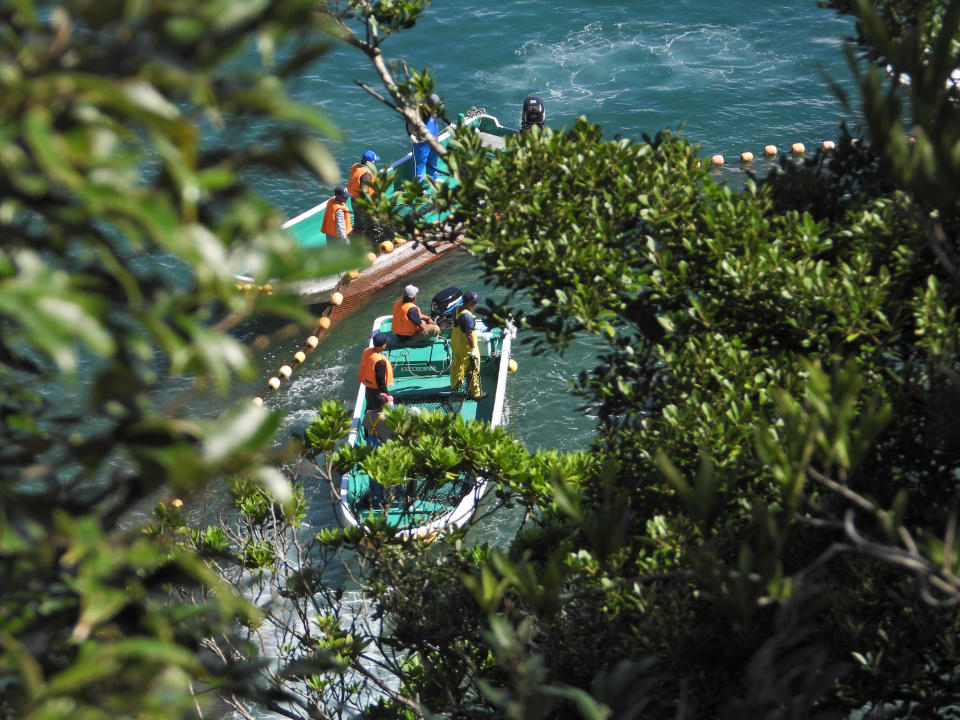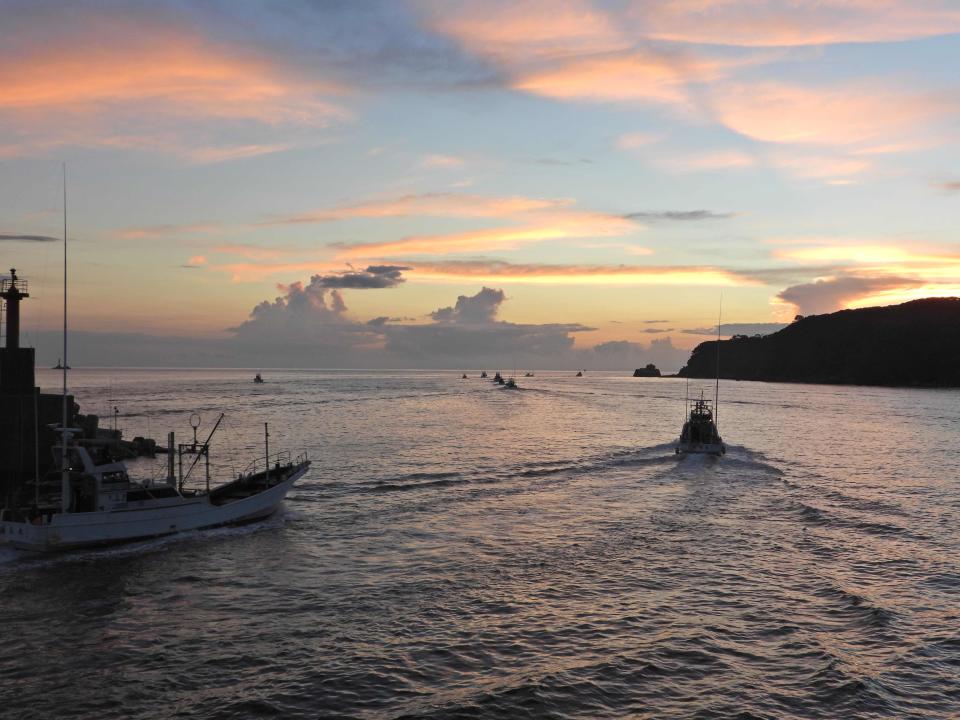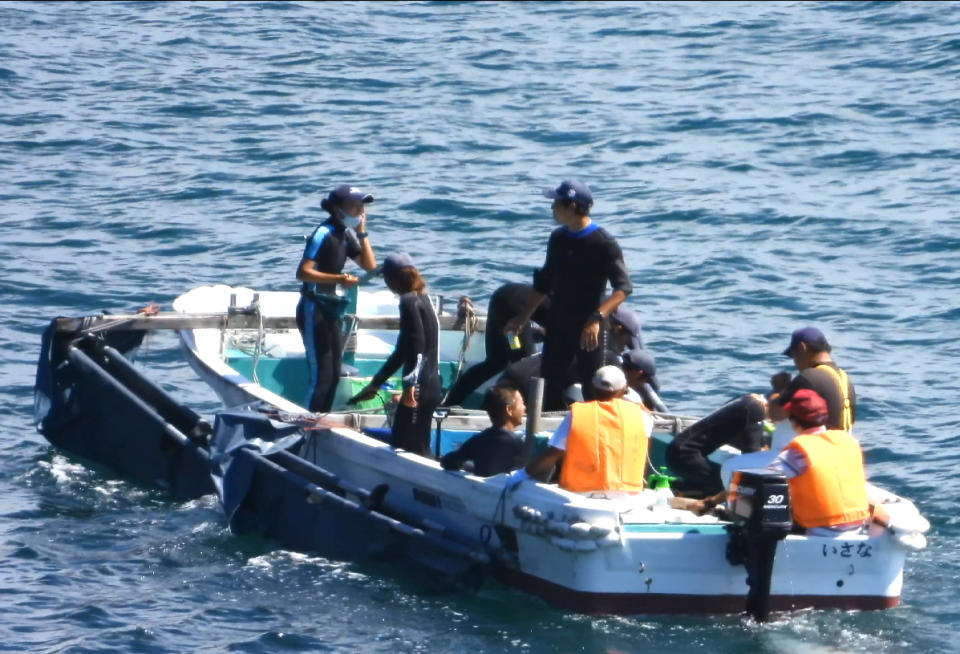Livestream shows dolphins captured during annual hunt in Japan
Pictures have emerged of a group of dolphins captured by hunters on the first day of Japan’s annual dolphin season.
As dawn broke on Tuesday, vision live-streamed on social media showed a fleet of boats set out from the Taiji coast, 415km southwest of Tokyo.
Watching from the shore, onlookers said they believed the hunters had set their sights on a group of bottlenose dolphins - a species highly valued by the marine park industry.
Perched high on a cliff top, it was difficult for investigators to make out what was happening between the nets bobbing on the ocean below.

During the annual “drives”, which occur between September and the last day of February, hunters drop metal poles into the water and bang on them, creating a wall of noise to herd the sound-sensitive marine animals.
Hundreds of wild dolphins and small whales are captured and sold to dolphin parks around the world.
Those deemed not beautiful enough to entertain tourists are slaughtered for their meat.
‘I’m so sorry this is happening in Japan’
As Tuesday’s hunt continued, investigators from Japanese-based NGO Life Investigation Agency (LIA) documented four being selected by trainers.
Moments after watching the animals taken into captivity, LIA director Ren Yabuki spoke to Yahoo News Australia about why he is working to raise awareness about dolphin hunting.

“Today the drive began and I watched four dolphins captured,” Mr Yakbuki said in Japanese.
“It’s very, very sad, I’m so sorry this is happening in Japan.
“I want to help lots of Japanese people to become aware of the what is happening in Japan.”
Japanese activists protesting dolphin hunt
Despite US-based Dolphin Project attracting thousands of views each year when it live-streams the dolphin drives, knowledge of the slaughter was until recently largely restricted in Japan.
This year could be different.
A coronavirus travel ban on US citizens entering Japan has led Dolphin Project to collaborate with the Japanese group LIA, who will be filming the hunts and narrating them in both English and Japanese.
Dolphin Project’s Lincoln O’Barry spoke to Yahoo News Australia from California, saying that he hoped the collaboration would increase awareness within Japan.
“We’re really pushing to get the message out to the Japanese people,” he said.
“These Japanese activists that are on the ground there have been working on the issue for a few years as well.
“Also, on the opening day of the hunt (this year), there was a demonstration in Taiji with a lot of Japanese activists from different organisations, which is really great to see.”
Some dolphin parks may not survive coronavirus pandemic
With the coronavirus restrictions shutting down entertainment venues, Mr O’Barry believes many dolphin parks may not survive the pandemic.
In recent years, China’s growing middle class developed an interest in attending US-style dolphinariums in their own country, leading them to place a large amount of orders to fill their tanks.
While Mr O’Barry suspects some orders for live animals have been placed ahead of the season, he hopes to see less dolphins captured this year.

Slaughter he hopes will also decrease as the Japanese become aware of the health risks of eating wildlife in the wake of the coronavirus pandemic which has been linked to the consumption of wild animals.
While dolphins are known to carry some coronaviruses, Mr O’Barry warns that the main health risk to humans from consuming dolphin meat is its high mercury content.
“I think (Japanese) people are more hesitant in terms of believing what their government tells them,” he said.
“We’ve been hounding on for years that this is a public health emergency because of the mercury.
“I think maybe a lot of people are thinking twice now before eating dolphin meat.”
An earlier version of this story said investigators believed a family group of four bottlenose dolphins had been captured, however it has since been clarified that the take comprised three bottlenose dolphins, including one juvenile, and a single Risso’s dolphin.
Do you have a story tip? Email: newsroomau@yahoonews.com.
You can also follow us on Facebook, Instagram and Twitter and download the Yahoo News app from the App Store or Google Play.




